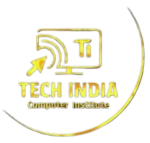TECH INDIA COMPUTER EDUCATION
“To be a leading institution in fostering technological excellence and innovation, empowering individuals from all backgrounds to become proficient in computer science and related fields. We envision a future where our graduates are catalysts for positive change, driving innovation, and shaping the digital landscape with their expertise and creativity.”






TECH INDIA COMPUTER EDUCATION CENTRE is a computer Education institute .This is run and managed by Tech computer education society. Tech computer education society has been registered under the society Act. 21, 1860.(Reg. No. 00418) from Govt. of Uttar Pradesh. It was established in 2019, Mainpuri, Uttar Pradesh.

Vision
A computer institute’s vision typically revolves around empowering individuals with the knowledge and skills needed to thrive in the rapidly evolving field of technology. Here’s a sample vision statement for a computer institute:
“To be a leading institution in fostering technological excellence and innovation, empowering individuals from all backgrounds to become proficient in computer science and related fields. We envision a future where our graduates are catalysts for positive change, driving innovation, and shaping the digital landscape with their expertise and creativity.”
Technologies You Will Learn





Scope Of Computer
2. Artificial Intelligence (AI) and Machine Learning (ML): AI and ML involve creating algorithms and systems that can mimic human intelligence and learn from data. Thisfield encompasses applications like natural language processing, computer vision, and predictive analytics.
3. Data Science and Big Data: Data science involves extracting insights and knowledge from large datasets through statistical analysis, machine learning, and data visualization techniques. Big data technologies are used to store, process, and analyze massive volumes of data.
4. Cybersecurity: With the increasing threat of cyber attacks, cybersecurity has become crucial for protecting systems, networks, and data from unauthorized access, breaches, and other security threats.
5. Computer Networking: Computer networking involves the design, implementation, and maintenance of communication systems that enable computers and devices to connect and communicate with each other, including local area networks (LANs), wide area networks (WANs), and the internet.
6. Cloud Computing: Cloud computing provides on-demand access to computing resources such as storage, processing power, and software over the internet. It includes services like Infrastructure as a Service (IaaS), Platform as a Service (PaaS), and Software as a Service (SaaS).
7. Internet of Things (IoT): IoT refers to the network of interconnected devices and sensors that collect and exchange data. This field involves developing applications and systems to enable communication and data exchange between IoT devices.
8. Virtual Reality (VR) and Augmented Reality (AR): VR and AR technologies create immersive experiences by combining computer-generated content with the real world or creating entirely virtual environments. They have applications in gaming, education, healthcare, and various industries.
9. Human-Computer Interaction (HCI): HCI focuses on designing interfaces and systems that facilitate interaction between humans and computers, with the goal of enhancing user experience, usability, and accessibility.
Experience
Education
Certification
job opportunities
The computer field offers a wide range of job opportunities across various sectors and industries. Here are some common job roles in the computer field:
Software Developer/Engineer:
Responsible for designing, developing, testing, and maintaining software applications and systems. Specializations may include web development, mobile app development, backend development, or full-stack development.
Data Scientist:
Analyzes and interprets complex datasets to extract actionable insights and drive data-driven decision-making. Skills in statistics, machine learning, and programming are essential.
Cybersecurity Analyst/Engineer:
Protects computer systems, networks, and data from cyber threats by implementing security measures, monitoring for security breaches, and responding to incidents.
Network Engineer/Administrator:
Designs, implements, and maintains computer networks, including LANs, WANs, and intranets. Responsible for ensuring network performance, availability, and security.
Systems Administrator:
Manages and maintains the hardware, software, and network infrastructure of an organization. Responsibilities include system configuration, troubleshooting, and ensuring system reliability and performance.





